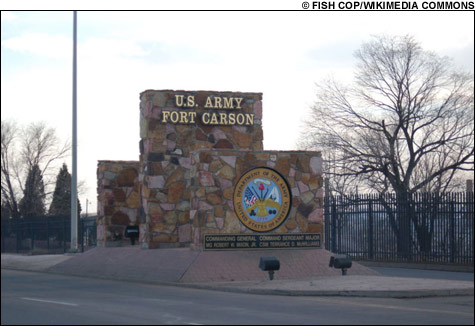
FORT HELL: Retired Army staff sergeant Andrew Pogany suffered from hallucinations and panic attacks while on active duty in September 2003 — the result, he says, of mandatory medication administered by the military. Since then, 17 of his fellow servicemen from Fort Carson, Colorado, have committed suicide. |
Upon returning from Iraq, 23-year-old Marine Lance Corporal Jeffrey Michael Lucey suffered episodes of such intense war-induced rage that he'd often need to be consoled by his parents, who would rock him back to normalcy in their laps. On July 22, 2004, unable to handle the intensity anymore — the daily vomiting, the feeling that he was a murderer, the fear that none of his military higher-ups even cared — Lucey wrapped a garden hose around his neck in the basement of his family's Belchertown, Massachusetts, home and hanged himself.During his last visit to the Northampton VA Medical Center in Leeds for Post-Traumatic Stress Disorder (PTSD) — a three-day stint in the hospital's psychiatric ward almost six weeks before he killed himself — Lucey had been prescribed a number of antipsychotic drugs, including Klonopin, Ativan, and Haldol. He was also given warnings that they not be taken with alcohol. Two days after his release, he destroyed his parents' car in an apparent suicide attempt. A little more than a month before he killed himself, say his parents, Kevin and Joyce Lucey, he was refused mental-health treatment by the Department of Veterans Affairs (known as the Veterans Administration until the late 1980s, but still commonly referred to as the VA) because he'd been drinking heavily. The Luceys insist that the VA focused on a symptom (the drinking) instead of the actual cause of his mental deterioration: PTSD.
In January 2008, the Luceys were awarded a $350,000 settlement from the VA, which admitted no wrongdoing in their son's suicide. This past Thanksgiving, the Luceys were once again left with an empty seat at the table and emptiness in their hearts. A few days before the holiday, they distributed a letter through the non-profit organization Veterans for Common Sense, which used Lucey's story as a cautionary tale for other veterans and their families.
Another front has opened in the wars being fought by the US military, and it is one for which the Pentagon was as unprepared as it was for the conflicts in Iraq and Afghanistan. The primary (though not the only) enemy is PTSD, and to fight it, US troops are desperately being prescribed a wide array of medicines, from anti-depressants to anti-anxieties. They are also self-medicating in numbers beyond the control of the Department of Defense (DoD) or the VA, and the military has failed to provide adequate long-term treatment and follow-up care. As a result, as we recognize this week the sixth anniversary of the start of the war in Iraq, America's troops both in that conflict and in the one in Afghanistan are literally fighting their wars on drugs — and a record number of both active troops and discharged veterans are committing suicide.
Suicidal tendency
Tragic stories like Lucey's are becoming more commonplace. The journal Military Medicine found that, during an 11-month period in 2004, 30 percent of soldiers evaluated by mental-health staff in Iraq said they had considered suicide within the past week. (A DoD intelligence-center report on psychotropic drugs acknowledges this finding.) Of those, almost 64 percent said they had specific plans to kill themselves.
Four years later, the situation has worsened. The Army announced in January 2009 that its suicide rate hit 138 — or little more than 20 per 100,000 — this past year, which surpassed previous highs of 115 in 2007 and 102 in 2006. (That's also higher than the suicide rate for the general population, which is 19.5 per 100,000.) And just this past week, the Army said it was investigating 24 potential suicides committed by troops in January and another 18 committed in February, up from 11 suicides in February 2008. If those numbers hold true, it will confirm what many have recently started to fear: that, for the first time since the wars began, monthly US troop deaths by suicide will have outpaced deaths in combat, and for two months in a row.
Among veterans, suicides are exponentially more frequent. The VA announced in September that 46 out of every 100,000 male veterans between the ages of 18 and 29 killed themselves in 2006, compared with 27 the year before. (For women, there was a slight improvement, as it was three in every 100,000, compared with eight in 100,000 the year before.)